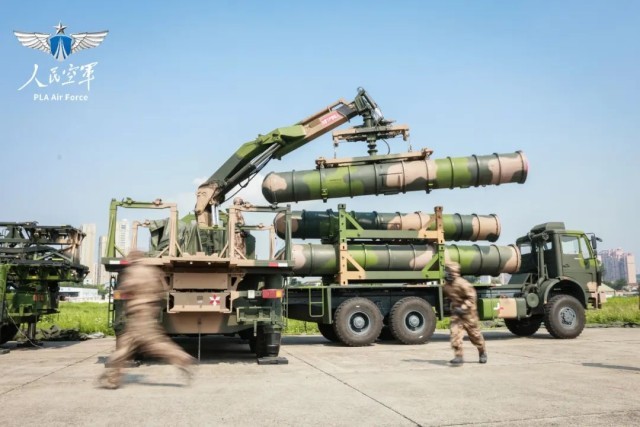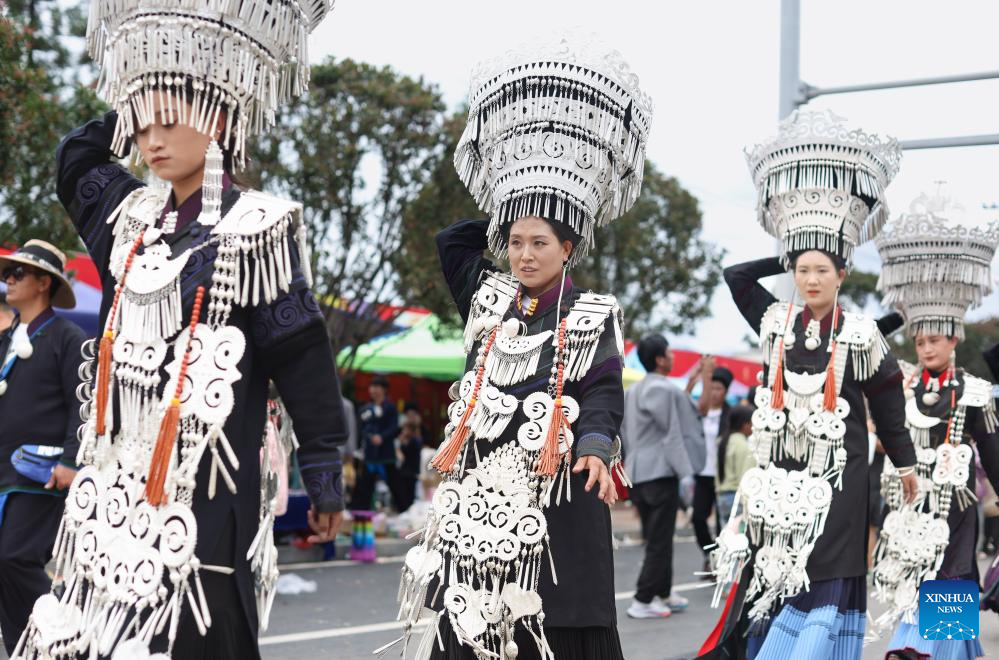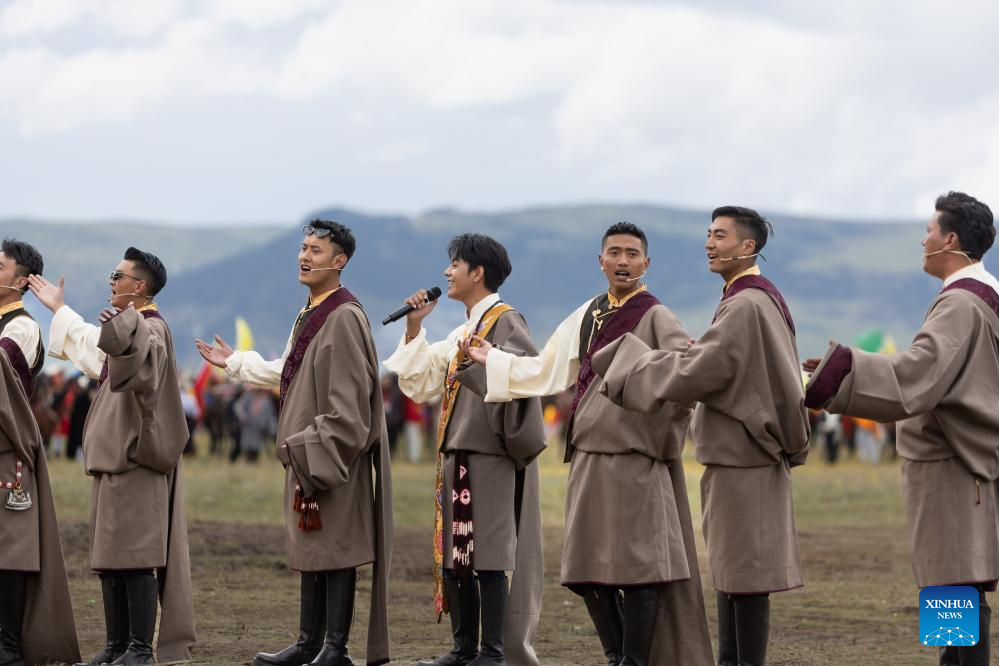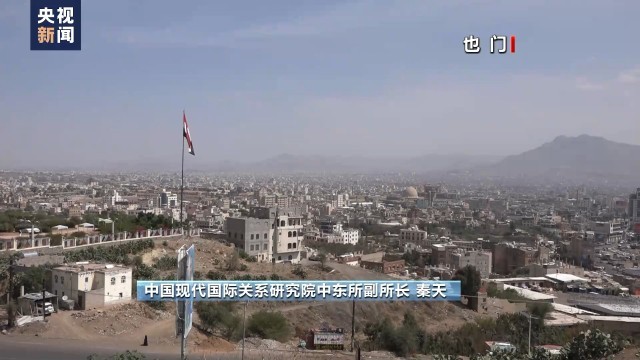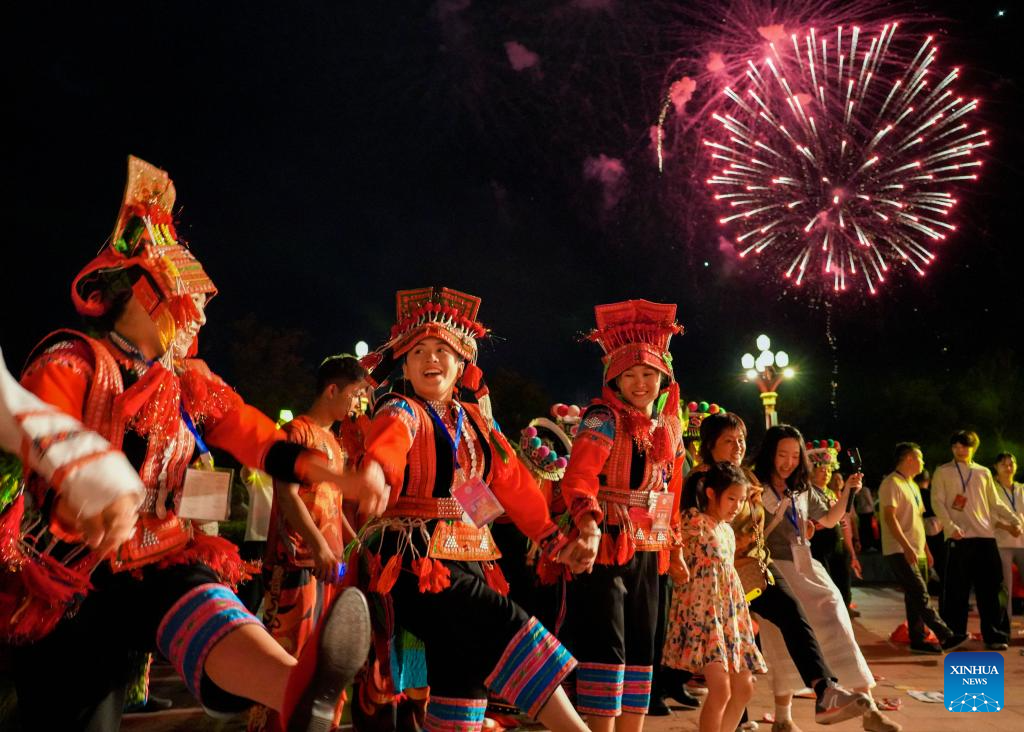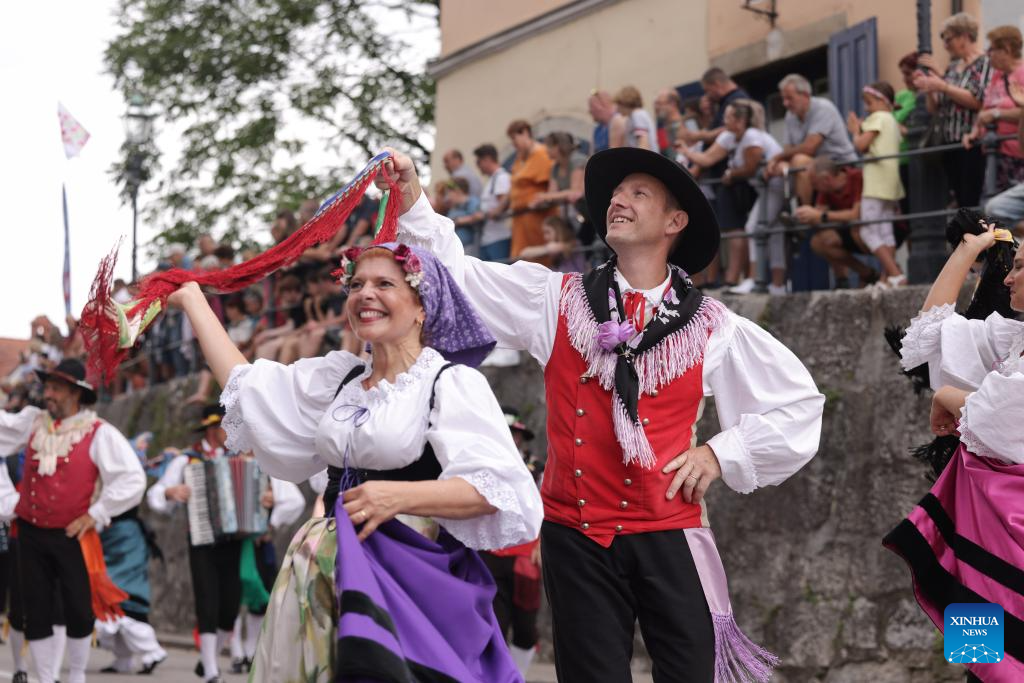【pg in bangalore marathahalli】Ancient Tunpu villages attract tourists in Guizhou
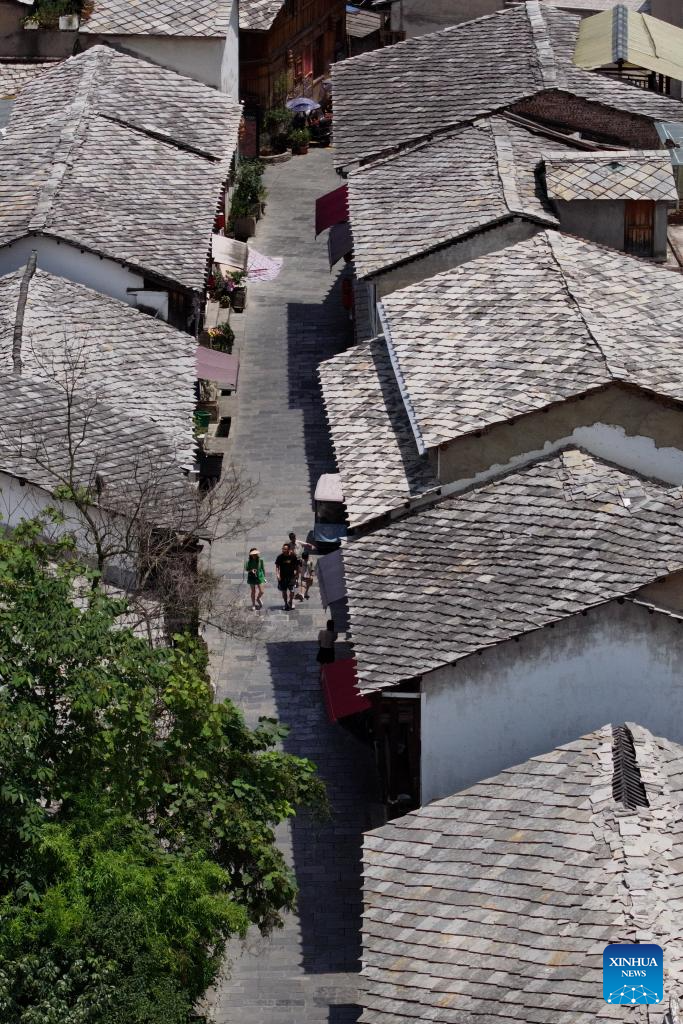
In this pg in bangalore marathahalliaerial drone photo, tourists visit Jiuzhou ancient town scenic area of Anshun City, southwest China's Guizhou Province, July 25, 2024.
Tunpu means "fort" in Chinese, referring to the complex of residential buildings in villages of Anshun built in the style of fortress for resisting the enemy's attacks in ancient times.
In the Ming Dynasty (1368-1644), some troops were sent to Anshun, where they built villages and cultivated land for farming. Their descendants have lived there over generations with their original living customs preserved. Thus the unique Tunpu culture has taken shape.
After more than 600 years, these stone-structured Tunpu residential buildings have endured and now become popular tourist destinations for many visitors. (Xinhua/Ou Dongqu)
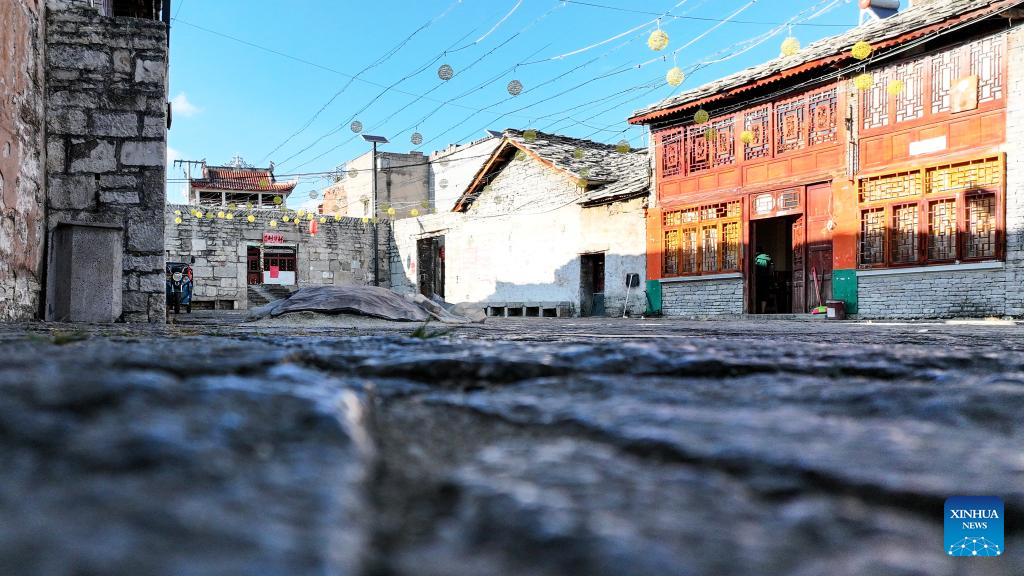
A drone photo taken on July 24, 2024 shows a view of Baojiatun Village in Xixiu District of Anshun City, southwest China's Guizhou Province.
Tunpu means "fort" in Chinese, referring to the complex of residential buildings in villages of Anshun built in the style of fortress for resisting the enemy's attacks in ancient times.
In the Ming Dynasty (1368-1644), some troops were sent to Anshun, where they built villages and cultivated land for farming. Their descendants have lived there over generations with their original living customs preserved. Thus the unique Tunpu culture has taken shape.
After more than 600 years, these stone-structured Tunpu residential buildings have endured and now become popular tourist destinations for many visitors. (Xinhua/Ou Dongqu)
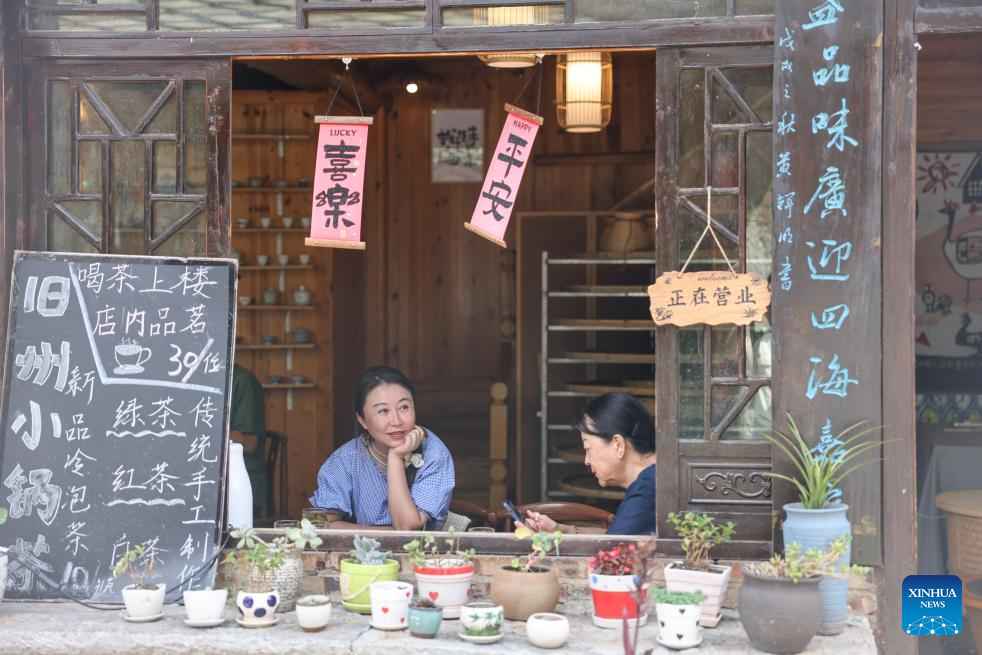
Tourists have tea at Jiuzhou ancient town scenic area of Anshun City, southwest China's Guizhou Province, July 24, 2024.
Tunpu means "fort" in Chinese, referring to the complex of residential buildings in villages of Anshun built in the style of fortress for resisting the enemy's attacks in ancient times.
In the Ming Dynasty (1368-1644), some troops were sent to Anshun, where they built villages and cultivated land for farming. Their descendants have lived there over generations with their original living customs preserved. Thus the unique Tunpu culture has taken shape.
After more than 600 years, these stone-structured Tunpu residential buildings have endured and now become popular tourist destinations for many visitors. (Xinhua/Ou Dongqu)
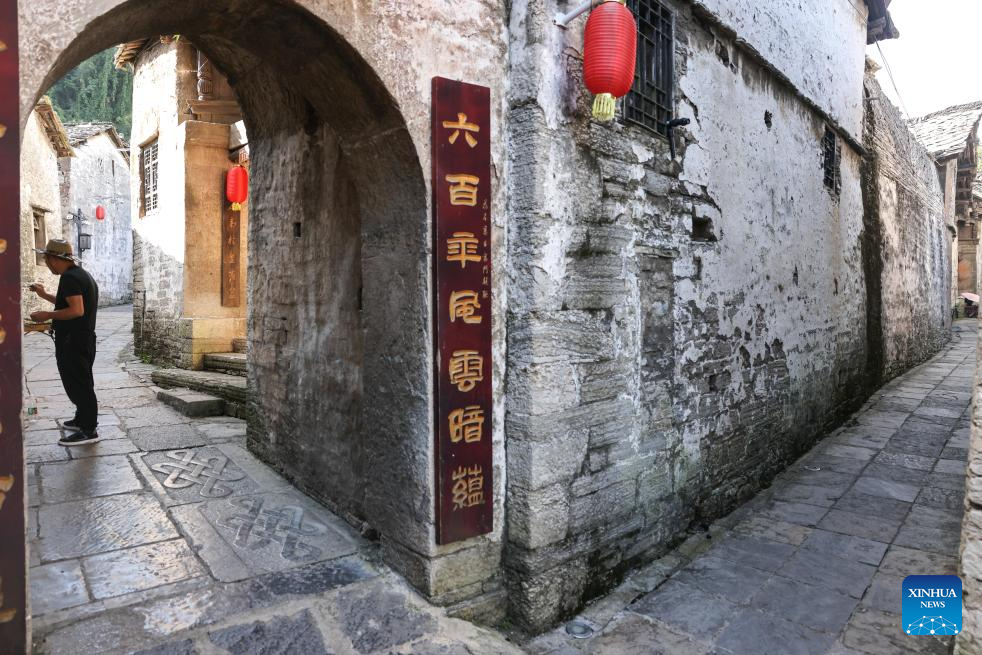
Lanes are pictured among stone buildings in Benzhai Village in Xixiu District of Anshun City, southwest China's Guizhou Province, July 23, 2024.
Tunpu means "fort" in Chinese, referring to the complex of residential buildings in villages of Anshun built in the style of fortress for resisting the enemy's attacks in ancient times.
In the Ming Dynasty (1368-1644), some troops were sent to Anshun, where they built villages and cultivated land for farming. Their descendants have lived there over generations with their original living customs preserved. Thus the unique Tunpu culture has taken shape.
After more than 600 years, these stone-structured Tunpu residential buildings have endured and now become popular tourist destinations for many visitors. (Xinhua/Ou Dongqu)
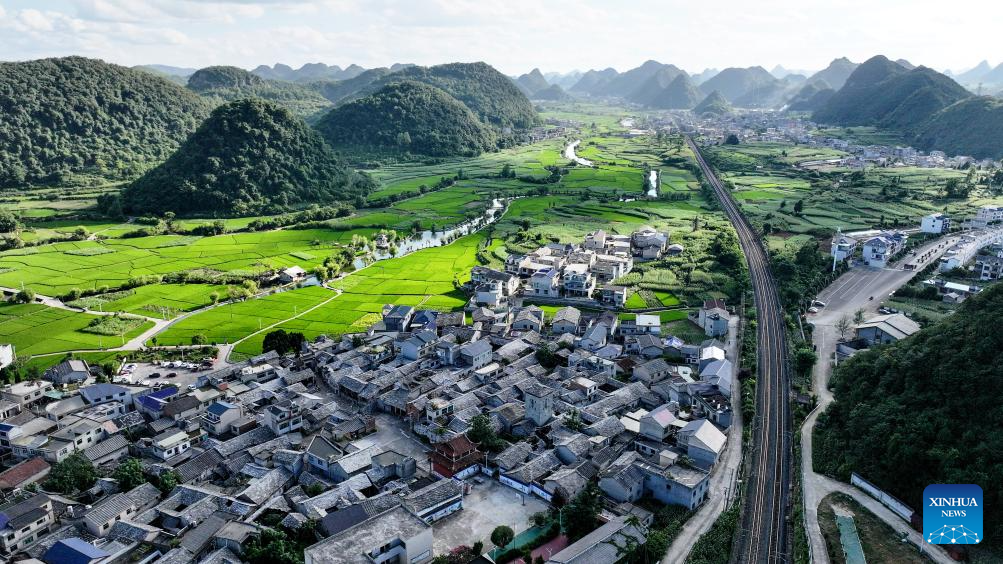
An aerial drone photo taken on July 24, 2024 shows Baojiatun Village in Xixiu District of Anshun City, southwest China's Guizhou Province.
Tunpu means "fort" in Chinese, referring to the complex of residential buildings in villages of Anshun built in the style of fortress for resisting the enemy's attacks in ancient times.
In the Ming Dynasty (1368-1644), some troops were sent to Anshun, where they built villages and cultivated land for farming. Their descendants have lived there over generations with their original living customs preserved. Thus the unique Tunpu culture has taken shape.
After more than 600 years, these stone-structured Tunpu residential buildings have endured and now become popular tourist destinations for many visitors. (Xinhua/Ou Dongqu)
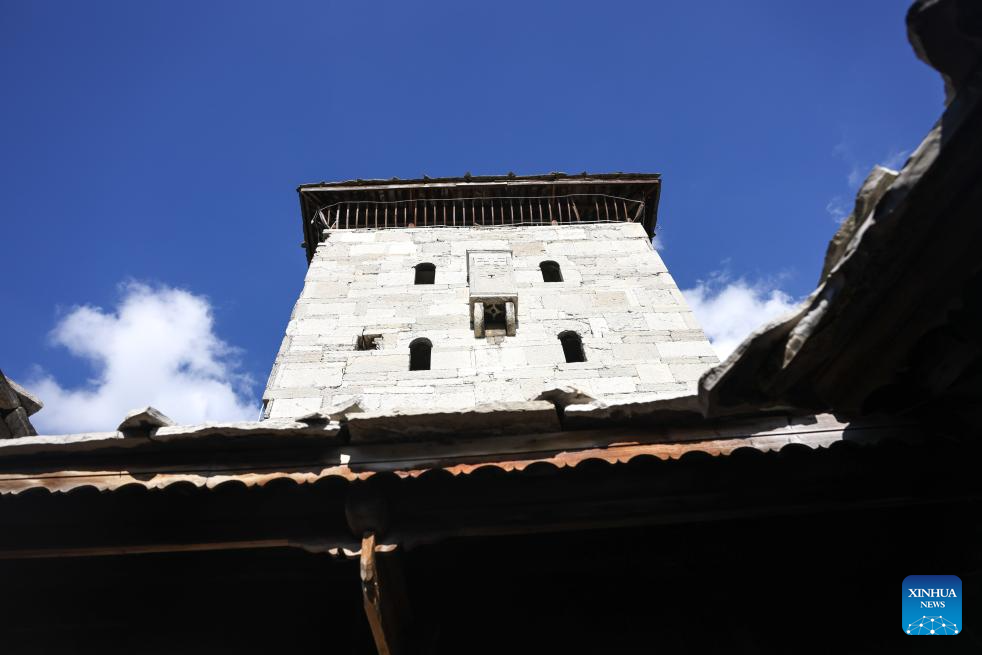
An ancient stone fortress is seen at Baojiatun Village in Xixiu District of Anshun City, southwest China's Guizhou Province, July 24, 2024.
Tunpu means "fort" in Chinese, referring to the complex of residential buildings in villages of Anshun built in the style of fortress for resisting the enemy's attacks in ancient times.
In the Ming Dynasty (1368-1644), some troops were sent to Anshun, where they built villages and cultivated land for farming. Their descendants have lived there over generations with their original living customs preserved. Thus the unique Tunpu culture has taken shape.
After more than 600 years, these stone-structured Tunpu residential buildings have endured and now become popular tourist destinations for many visitors. (Xinhua/Ou Dongqu)

An aerial panoramic photo taken with a drone on July 25, 2024 shows Jiuzhou Township in Xixiu District of Anshun City, southwest China's Guizhou Province.
Tunpu means "fort" in Chinese, referring to the complex of residential buildings in villages of Anshun built in the style of fortress for resisting the enemy's attacks in ancient times.
In the Ming Dynasty (1368-1644), some troops were sent to Anshun, where they built villages and cultivated land for farming. Their descendants have lived there over generations with their original living customs preserved. Thus the unique Tunpu culture has taken shape.
After more than 600 years, these stone-structured Tunpu residential buildings have endured and now become popular tourist destinations for many visitors. (Xinhua/Ou Dongqu)
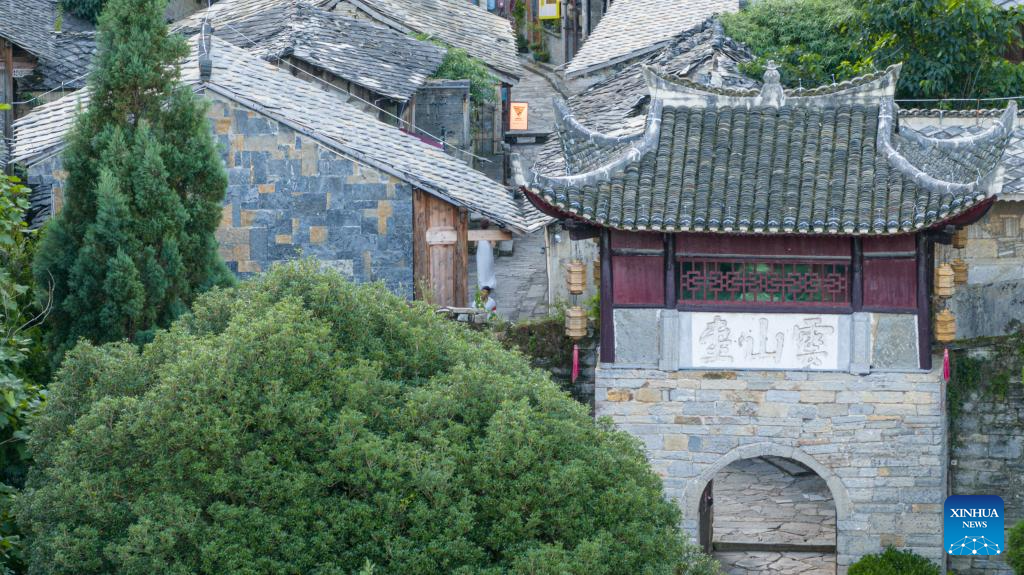
An aerial drone photo taken on July 23, 2024 shows a view of Yunshantun Village in Xixiu District of Anshun City, southwest China's Guizhou Province.
Tunpu means "fort" in Chinese, referring to the complex of residential buildings in villages of Anshun built in the style of fortress for resisting the enemy's attacks in ancient times.
In the Ming Dynasty (1368-1644), some troops were sent to Anshun, where they built villages and cultivated land for farming. Their descendants have lived there over generations with their original living customs preserved. Thus the unique Tunpu culture has taken shape.
After more than 600 years, these stone-structured Tunpu residential buildings have endured and now become popular tourist destinations for many visitors. (Xinhua/Ou Dongqu)
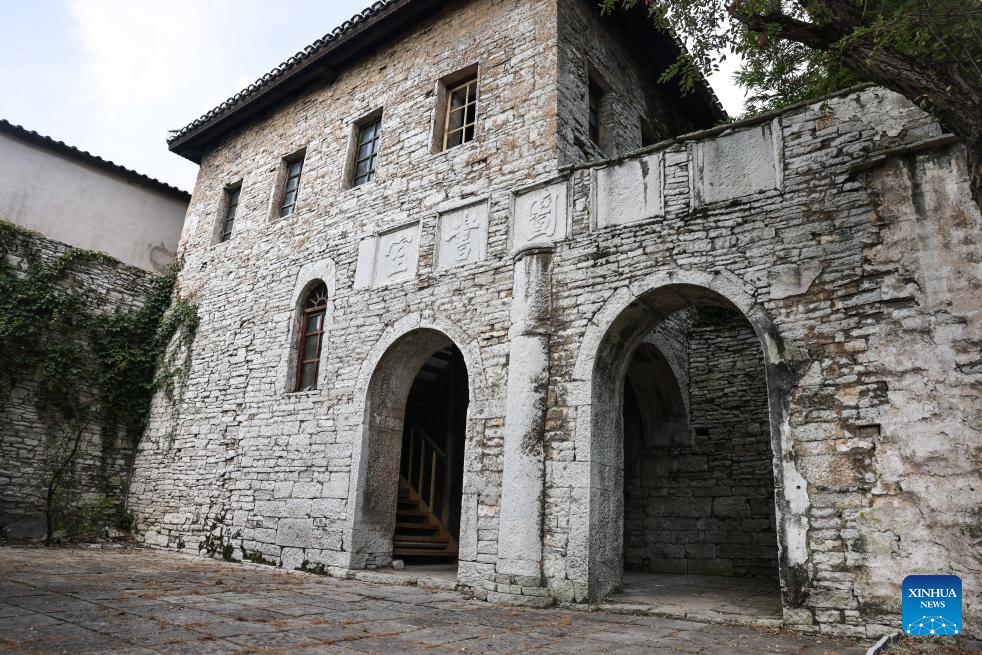
A stone building is pictured at an ancient town in Pingba District of Anshun City, southwest China's Guizhou Province, July 25, 2024.
Tunpu means "fort" in Chinese, referring to the complex of residential buildings in villages of Anshun built in the style of fortress for resisting the enemy's attacks in ancient times.
In the Ming Dynasty (1368-1644), some troops were sent to Anshun, where they built villages and cultivated land for farming. Their descendants have lived there over generations with their original living customs preserved. Thus the unique Tunpu culture has taken shape.
After more than 600 years, these stone-structured Tunpu residential buildings have endured and now become popular tourist destinations for many visitors. (Xinhua/Ou Dongqu)
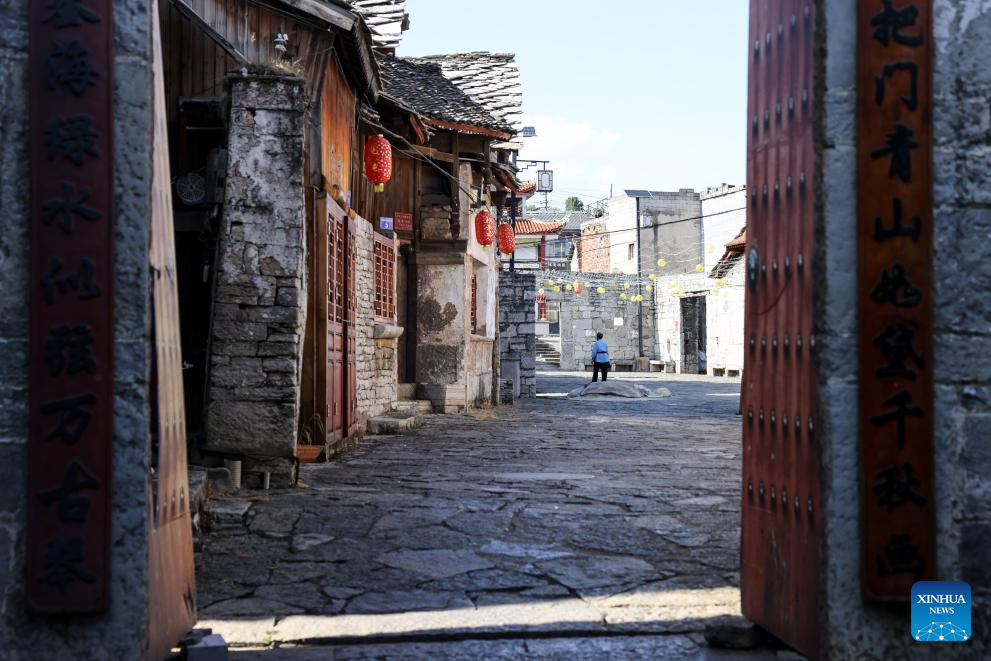
This photo taken on July 24, 2024 shows a view of Baojiatun Village in Xixiu District of Anshun City, southwest China's Guizhou Province.
Tunpu means "fort" in Chinese, referring to the complex of residential buildings in villages of Anshun built in the style of fortress for resisting the enemy's attacks in ancient times.
In the Ming Dynasty (1368-1644), some troops were sent to Anshun, where they built villages and cultivated land for farming. Their descendants have lived there over generations with their original living customs preserved. Thus the unique Tunpu culture has taken shape.
After more than 600 years, these stone-structured Tunpu residential buildings have endured and now become popular tourist destinations for many visitors. (Xinhua/Ou Dongqu)
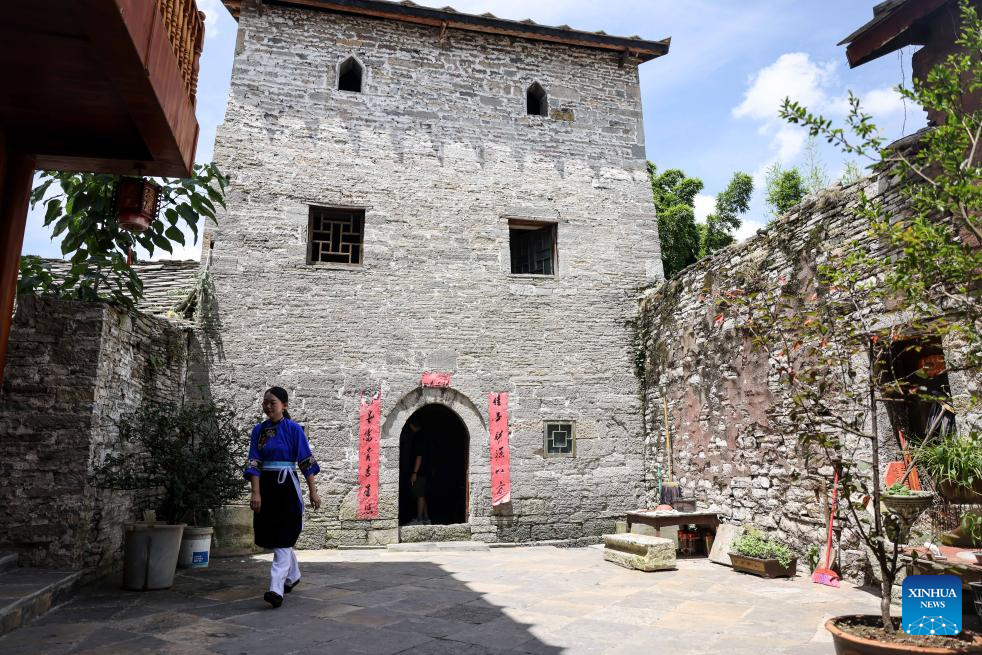
An ancient stone fortress is seen at Jiuzhou ancient town scenic area in Xixiu District of Anshun City, southwest China's Guizhou Province, July 24, 2024.
Tunpu means "fort" in Chinese, referring to the complex of residential buildings in villages of Anshun built in the style of fortress for resisting the enemy's attacks in ancient times.
In the Ming Dynasty (1368-1644), some troops were sent to Anshun, where they built villages and cultivated land for farming. Their descendants have lived there over generations with their original living customs preserved. Thus the unique Tunpu culture has taken shape.
After more than 600 years, these stone-structured Tunpu residential buildings have endured and now become popular tourist destinations for many visitors. (Xinhua/Ou Dongqu)
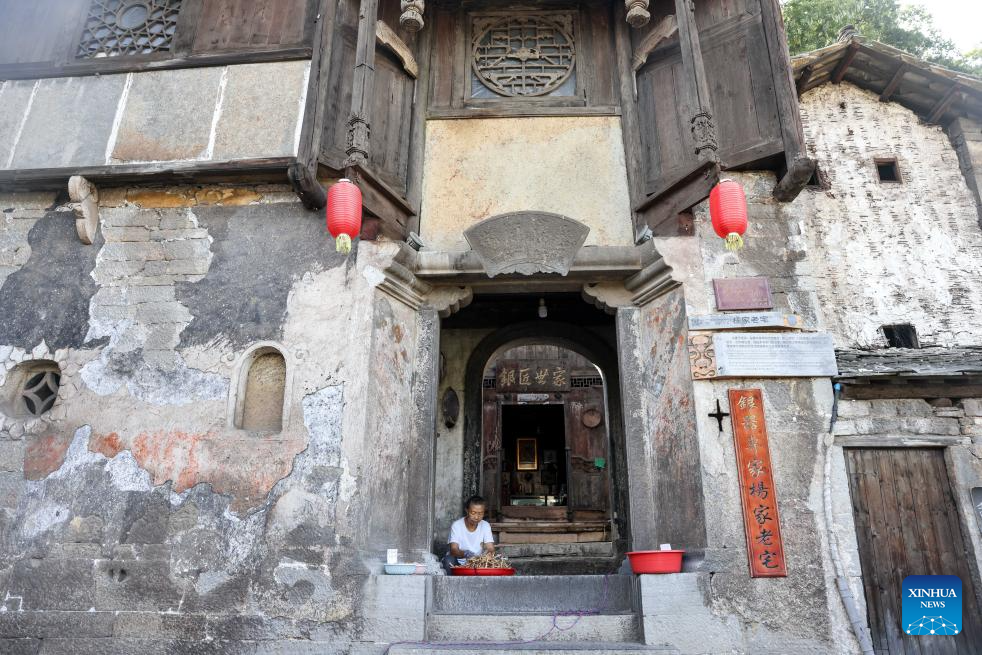
A resident is seen in a stone building in Benzhai Village in Xixiu District of Anshun City, southwest China's Guizhou Province, July 23, 2024.
Tunpu means "fort" in Chinese, referring to the complex of residential buildings in villages of Anshun built in the style of fortress for resisting the enemy's attacks in ancient times.
In the Ming Dynasty (1368-1644), some troops were sent to Anshun, where they built villages and cultivated land for farming. Their descendants have lived there over generations with their original living customs preserved. Thus the unique Tunpu culture has taken shape.
After more than 600 years, these stone-structured Tunpu residential buildings have endured and now become popular tourist destinations for many visitors. (Xinhua/Ou Dongqu)
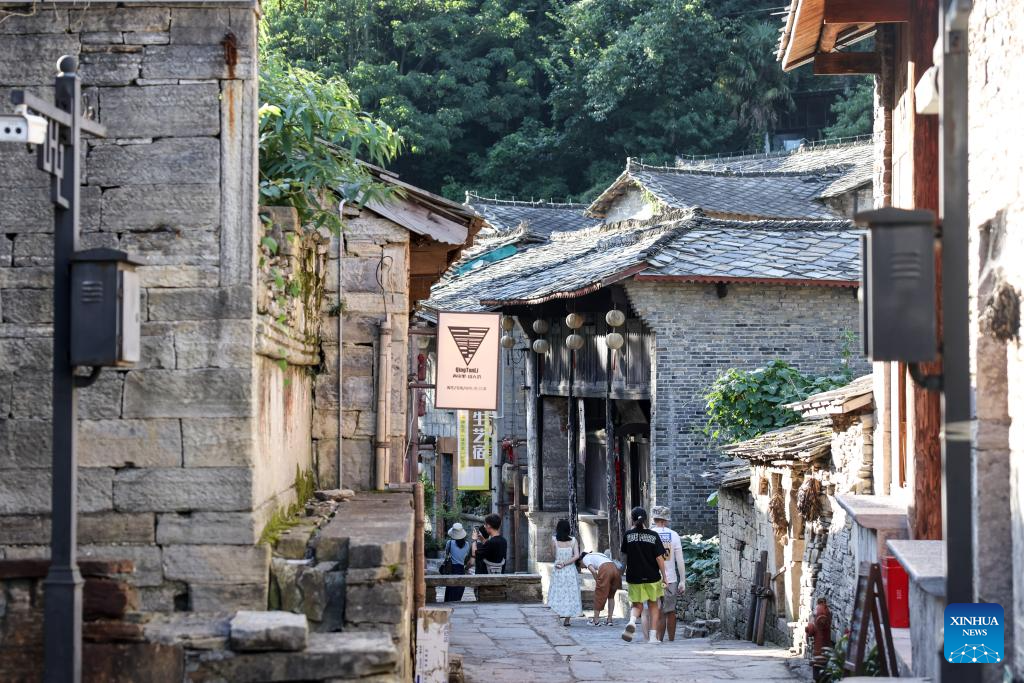
Tourists visit Yunshantun Village in Xixiu District of Anshun City, southwest China's Guizhou Province, July 23, 2024.
Tunpu means "fort" in Chinese, referring to the complex of residential buildings in villages of Anshun built in the style of fortress for resisting the enemy's attacks in ancient times.
In the Ming Dynasty (1368-1644), some troops were sent to Anshun, where they built villages and cultivated land for farming. Their descendants have lived there over generations with their original living customs preserved. Thus the unique Tunpu culture has taken shape.
After more than 600 years, these stone-structured Tunpu residential buildings have endured and now become popular tourist destinations for many visitors. (Xinhua/Ou Dongqu)
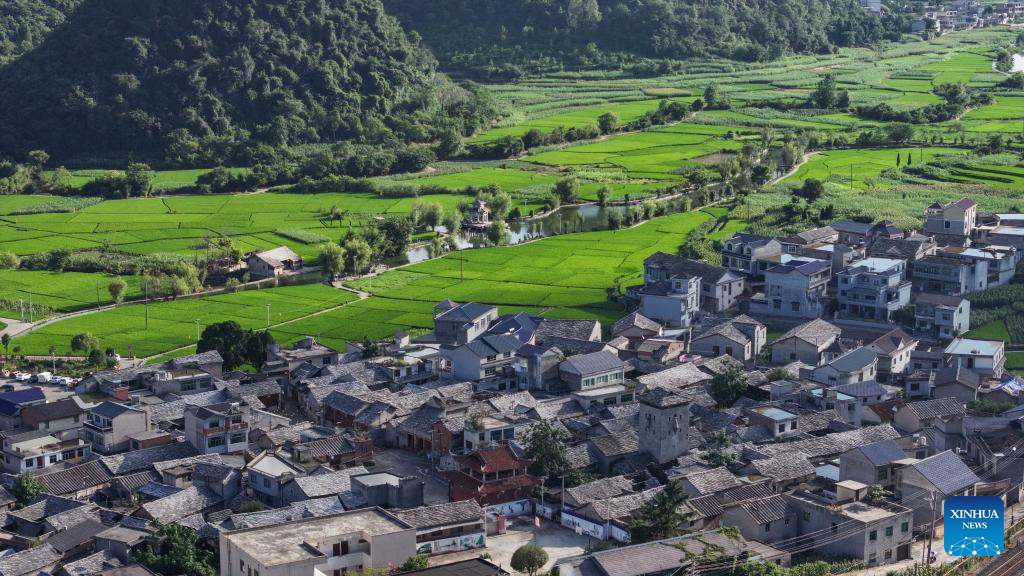
An aerial drone photo taken on July 24, 2024 shows Baojiatun Village in Xixiu District of Anshun City, southwest China's Guizhou Province.
Tunpu means "fort" in Chinese, referring to the complex of residential buildings in villages of Anshun built in the style of fortress for resisting the enemy's attacks in ancient times.
In the Ming Dynasty (1368-1644), some troops were sent to Anshun, where they built villages and cultivated land for farming. Their descendants have lived there over generations with their original living customs preserved. Thus the unique Tunpu culture has taken shape.
After more than 600 years, these stone-structured Tunpu residential buildings have endured and now become popular tourist destinations for many visitors. (Xinhua/Ou Dongqu)
Editor: JYZ(责任编辑:娱乐)
- ·Zibo in E China witnesses harvest season of kiwi fruits
- ·Scenery of Yellow River in Dari County, NW China
- ·Workers pick tea leaves in India
- ·International youngsters revel in art exchanges in north China
- ·Parade of 51st National Costumes and Clothing Heritage Day held in Slovenia
- ·茫茫大海摆战场,海军某支队舰艇编队开展多科目训练
- ·Folk horse racing event celebrates Tibetan culture
- ·转存!60条要点速览二十届三中全会《决定》
- ·沙特王储发声:必须动员一切力量制止以色列对巴侵犯
- ·Over 150,000 relocated in east China province as Typhoon Gaemi nears
- ·中国功夫,到非洲了!
- ·转存!60条要点速览二十届三中全会《决定》
- ·中国新技术撬动欧洲传统汽车工业
- ·研判态势、分析数据、制订方案……海空携手精准打击目标
- ·Parade of 51st National Costumes and Clothing Heritage Day held in Slovenia
- ·In pics: Summer travel season begins in Xizang with surge in tourist arrivals
- ·Beautiful scenery at Bosten Lake
- ·法国小伙夏尔眼里的新疆十大文物宝贝⑦:唐益谦、薛光泚、康大之请给过所案卷
- ·Villagers display folk costume in Pulan County, SW China's Xizang
- ·Gansu Longnan carries out ancient book protection cultural volunteer service


